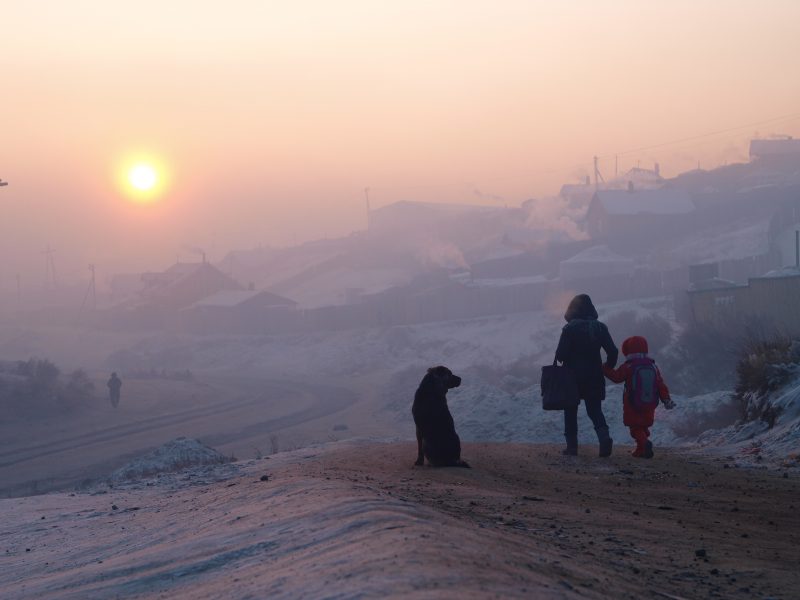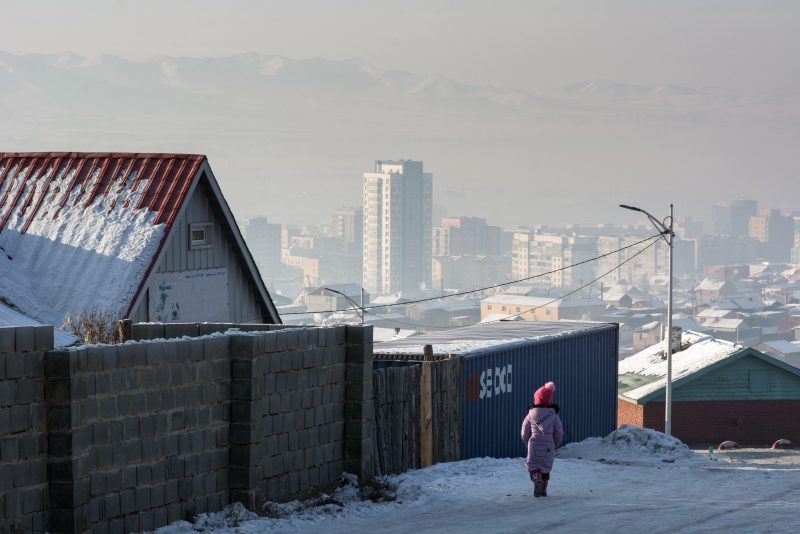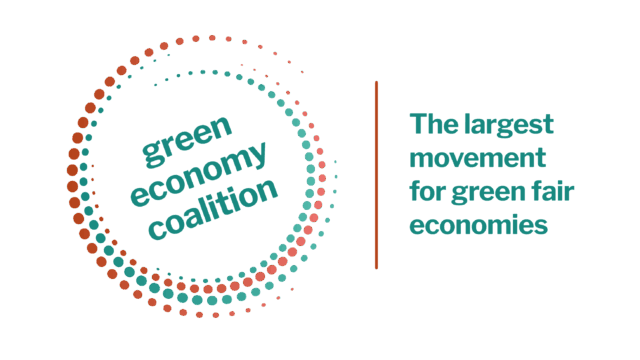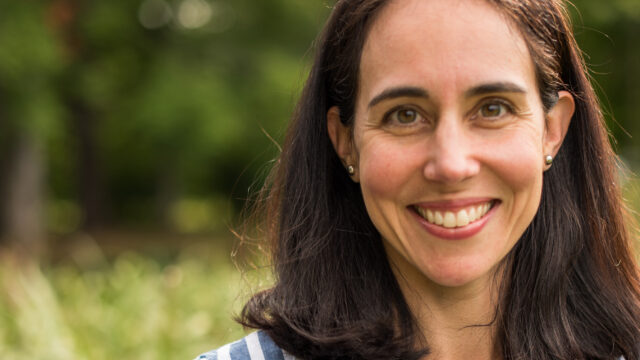"It's like a warzone": Life in the world's most polluted city

Step outside on a winter’s day in Ulaanbaatar, the capital of Mongolia, and you’ll immediately notice two things. The first is the bitter cold: temperatures in January regularly reach −40 °C, making the city the coldest capital on the planet. The second is the thick, noxious smog that blankets the air, burning your throat and reducing visibility sometimes to mere metres.
In fact, the city has some of the worst air quality in the world – even worse than notorious hotspots like Beijing and New Delhi. And the problem is growing worse every year. And, as our recent Green Economy Barometer for Mongolia shows, the country is rapidly urbanizing, with Ulaanbaatar almost tripling in population over the last twenty years. Most inhabitants rely on cheap local coal to stave off the freezing conditions, especially the large numbers who live in traditional Mongolian Gers.
But what is it like to live in one of the most polluted cities in the world? How do people – both native Mongolians, and visitors to the city – cope with the toxic air that they live and work in every day? To answer that question, we’ve collected perspectives and stories from Ulaanbaatar’s residents, based on interviews, blogs and newspapers, talking about day to day life in the smog.
“ I‘ve been working as a kindergarten teacher for over 30 years, and I’ve noticed that our kids immune systems seem to be getting weaker and weaker every year.”
The locals: kindergarten teachers and their students
We interviewed two kindergarten teachers at a school located in one of the most polluted districts in Ulaanbaatar city, teaching students between the ages of 3 to 5. We have kept their names anonymous to protect their privacy.
Teacher 1
“I‘ve been working as a kindergarten teacher for over 30 years, and I’ve noticed that our kids immune systems seem to be getting weaker and weaker every year. They get sick easily and most of them have started to show all types of allergies, from runny noses and itchy eyes to sore throats. Now some are even developing food allergies! Some of my kids can’t eat eggs, milk and apples.
We do try to boost our kids’ immune systems, we give them fruits, hot sea buckthorn juice and curd drink in addition to their regular meals. And we try to make our kids physically as active as possible, but with the air pollution so bad you wonder if it’s enough.
Speaking just for myself, I’ve experienced headaches, diarrhea and a burning sensation in my nose during the winter months, thanks to the air quality. I’ve bought an air pollution mask, but I don’t know how much difference it makes.
One of the saddest things about all this air pollution is the impact it has on pregnancies, and the number of babies that die in the womb. I have witnessed it so many times. The most personal case was my daughter-in-law, who was really close to her due date but unfortunately lost her baby in her womb. The doctors told us that the baby was exposed to too much carbon dioxide from the air pollution. Lately, doctors and the government have started to advise people not to carry children during winter.”

Teacher 2
“I’ve been teaching kindergarten kids for the last 5 years. Every year, the children in my class usually start to get sick from November, when the weather gets cold and the air gets dirty. During the winter, we make our children gargle and eat more fruit to try to counteract the pollution, but they still get sick.
It’s hard to exaggerate how bad the air is in Ulaanbaatar. The closer you get to a ger district, the worse the air gets; in the ger districts themselves you can’t even see what is right in front of you. But I don’t wear any masks.
When my own kids get sick at home, I bombard them with a bunch of medicines straight away. And if they are still sick, I send them to the countryside to get some fresh air. And they become healthy after spending some time there! I really think clean air is so important for everyone.”
Sometimes I feel like the parents don’t care enough about their kid’s health. They think that what they should do as parents is just to feed their kids and that’s it. Parents don’t talk to their kids and try to see their problems as important as that of adults.
US Citizens
“Walking through Ulaanbaatar during the winter is sometimes like walking through a Hollywood depiction of a warzone. Smoke is everywhere. It doesn’t rise or leave, it just hovers in the air seeping into lungs, clothing, hair, and even under fingernails. The scent of the city never is entirely gone, even in the most ventilated apartments.
As Americans, we lived in a country that owes our clean air to laws like the Clean Air Act of 1970. For almost 50 years, America has had clean air and the expectation is that we will continue to do so, but I don’t think most of us fully understand what these laws do to improve our way of life. I certainly didn’t.
Until I lived in Mongolia I took clean air as a given. But now I realize that with rises in the world population any pollution free environment is no longer a natural state… What we consider “natural” is not something that can be achieved without combined efforts to make it so. 1
“ It’s tragic: mothers have to burn coal in their gers to survive, but then they lose their babies in their wombs due to all the carbon dioxide”
Indian citizen
“On summer days, from my office window, I can see the beautiful snow-dappled mountains that surround Ulaanbataar; during the heavily polluted winter months the horizon is completely hidden behind a thick grey-brown smoky haze.
On a bad day, the city’s air pollution is so thick you cough when you walk outside. I’ve also witnessed cars turning on their headlights at 10am just for visibility. An Australian woman who volunteers at the Bank refuses to walk outside without wearing a heavy-duty air pollution mask. People often laugh at her ridiculous appearance, she’s even been photographed by children passing her in the street, but she’s seriously worried about the potential long-term damage. What about the Mongolian people? What about the children being born here?” 2
Japanese tourist
“Air pollution in Ulaanbaatar city is really bad. Winter times are the hardest. My throat hurts just by sitting in a car for 20 minutes to get to my hotel." 3
Conclusion
Regardless of where you are from, visiting Ulaanbaatar during winter is a deeply unpleasant experience. The smell of smog, limited visibility during nights and days, and the choking air are all impossible to escape from. People who only stay in Mongolia for a short time might not truly experience the seriousness of the air pollution. But the real victims are all around. It’s tragic: mothers have to burn coal in their gers to survive, but then they lose their babies in their wombs due to all the carbon dioxide.
- Khulan Jamiyandorj, ECRC
Images: UNICEF Mongolia
Footnotes
Ulaanbaatar’s air pollution crisis: Summertime complacency won’t solve the wintertime problem; World Bank Blogs


